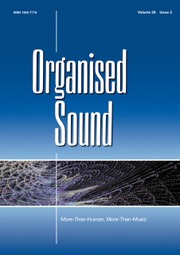No CrossRef data available.
Article contents
Music as Organised Time: A strategy for transmedial composition and a questioning of the relation between music and sound
Published online by Cambridge University Press: 21 December 2018
Abstract
As a consequence of the universal alphabet of binary code, music is expanding to include transmedia practices. This text suggests that the seemingly exclusive bond between the art form of music and its primary medium, sound, might be opened up to include other media. If the practices of composers who also appear as sound- and kinetic artists are not recognised as music, possible contemporary perspectives on past music is lost and the future development of music is inhibited.
The author presents an artistic perspective on transmediality, where two questions are addressed. The first is whether or not a transmedial structure can be made with light, movement and sound – and if so, how is this done? A strategy for transmedial composition with light, sound and movement is proposed, and exemplified with hand drawings. The second question raised in this article concerns whether or not transmedial compositions result in music. An idea of music as organised time is developed, and includes a discussion on the exclusive relation between art form and medium, especially between sound and music.
Information
- Type
- Articles
- Information
- Organised Sound , Volume 23 , Special Issue 3: Sound and Kinetics: Performance, artistic aims and techniques in electroacoustic music and sound art , December 2018 , pp. 246 - 255
- Copyright
- © Cambridge University Press 2018

